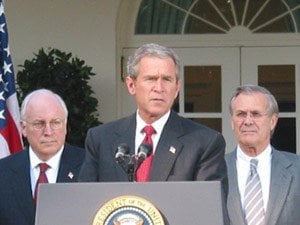Bush Adminstration Convicted of War Crimes and Crimes against Humanity

This omission might be due, at least in part, to the fact that Mr. Bush is now a convicted war criminal who dares not travel abroad out of fear of being arrested.
In February 2011, Bush was forced to cancel a scheduled appearance in Geneva, Switzerland after human rights groups filed a criminal complaint charging him with violating international treaties against torture.
His trouble increased dramatically a year ago when Bush — along with former Vice President Dick Cheney, former Defense Secretary Donald Rumsfeld, and several other top Bush administration officials — were convicted of war crimes in absentia by a special war crimes tribunal in Kuala Lumpur, Malaysia.
The Kuala Lumpur War Crimes Tribunal was convened and conducted according to internationally recognized procedures and rules of evidence, and the week-long hearing ended with the five-member panel unanimously delivering guilty verdicts.
What is the significance of that tribunal? Is its verdict legally binding? Are there troublesome aspects to the idea that a foreign tribunal can sit in judgment of a U.S. President — whatever we may think of his actions? We will discuss these vitally important questions with Dr. Francis Boyle, a professor of international law at the University of Illinois College of Law. He served as a prosecutor at the tribunal.
No comments:
Post a Comment